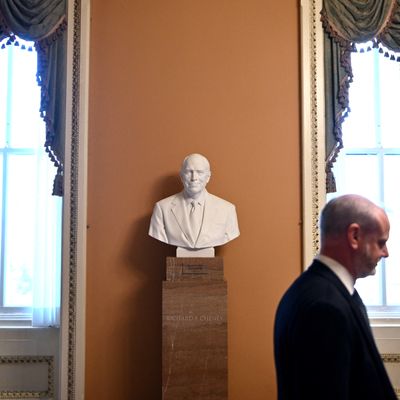
A bust of former Dick Cheney is seen at the Capitol in Washington in November.
Photo: Mandel Ngan/AFP/Getty Images
In death, there are now two Dick Cheneys.
One is the Cheney who was, without question, the most powerful vice-president in the history of the United States, a brilliant, ruthless, and deeply destructive man who remade the domestic and global order in less than a decade. The other is what contemporary Democrats and Republicans, bereft of real memory, perceive: a politician almost completely defined by his opposition to Donald Trump. Cheney’s daughter, Liz, was a proud conservative congresswoman who voted to impeach Trump after January 6; for her bravery, she faced down a Trump-backed challenger and lost badly. Her father, naturally, took umbrage, and he came to represent, for many liberals, the honor that Republicans in the Trump age had supposedly lost. Cheney was, by last year, so rehabilitated that Kamala Harris gladly accepted his endorsement and declared that the architect of the war on terror and the post-9/11 surveillance state was a “true patriot.”
Implied in this embrace was a myth that many liberals have come to accept: Trump is the defiler of a more noble Republican Party, one defined by men like George W. Bush and Cheney. Trump is the subversive, the outlaw, the unhinged autocrat running rampant over conservative traditions that once helped hold the country together. Establishment Republicans who are still wary of Trump share this view. They miss the Bush-Cheney regime and lament that Trump seemed to shatter the bridge between the 2000s and the balky future we must now inherit. And it’s true that Trump rose to power on the strength of his repudiation of Cheney’s blood-drenched legacy. Trump, to the shock of virtually all political pundits, won the Republican nomination while bashing the Iraq War. He promised, again and again, to be a president for peace, a global dealmaker who could avert further catastrophe. In his skepticism of foreign entanglements, he seemed like he was poised to crush the neoconservative movement for good.
The reality of President Trump, of course, is far more fraught. If he has found a way to an uneasy cease-fire between Israel and Hamas, he is simultaneously on the verge of initiating a cataclysmic regime-change war in Venezuela. GOP Hawks are plenty emboldened, even as isolationists seek some version of restraint. But what is most obvious, now that Trump has barreled through nearly a year of his second term, is that Cheney’s legacy is alive and well within his administration. Fully enabled by a right-wing Supreme Court with two Bush appointees, Trump is an unfettered executive in possession of near-limitless power. He is immune from prosecution. He has unilaterally laid waste to the federal government. He is behaving exactly as Cheney believed a president should behave.
Cheney, as Andrew Sullivan recently pointed out, was no constitutional conservative. He believed the American government could undertake extrajudicial torture. He believed military strikes could be launched any time, anywhere, and for any reason; he was never for a moment apologetic about the destruction his military unleashed. Trump’s lawless military operation in the Caribbean, where at least 70 supposed drug smugglers have been killed without any serious attempt to figure out whether they were guilty of crimes, has all the hallmarks of a Cheney adventure. The youngest-ever chief of staff under Gerald Ford, Cheney came of age in the wake of Richard Nixon’s downfall and resented, for the rest of his life, the post-Watergate reforms that placed restraints on the presidency.
His religion was the so-called unitary-executive theory: Presidents should be able, in almost all instances, to do as they wish. Emergency powers could make a monarch out of a president, especially in wartime, and that was Cheney’s greatest wish. September 11 handed him the pretext for imperial rule that he had always craved. Even if, in his view, there was as little as a one percent chance of a terrorist attack, the U.S. had to wage war preemptively. It didn’t matter that Iraq wasn’t in possession of weapons of mass destruction or that Afghanistan didn’t hold the key to preventing future terrorist attacks. The wars would be fought, he hoped, without end, because “terror” doesn’t ever stop. It was Karl Rove, working beneath Cheney, who likely uttered the most notorious and apropos statement to sum up Bush and Cheney’s eight years in power: “When we act, we create our own reality. And while you’re studying that reality — judiciously, as you will — we’ll act again, creating other new realities, which you can study too, and that’s how things will sort out.”
What could better describe the entire Trump ethos? The disorienting postmodern world we now inhabit? Trump, like Cheney, is a heedless liar who believes he can, over time, transcend the lie. It didn’t matter to Cheney, ultimately, whether Saddam Hussein was sitting on a stockpile of weapons of mass destruction. If the U.S. acted, that was sufficient; there would be a war, people would die, and a nebulous objective would be closer to being achieved. Cheney never regretted the Iraq War, violating the Geneva Conventions, or indefinitely detaining innocents at Guantanamo. He had no apologies for the Patriot Act or for ceaselessly spying on Americans. Congressional oversight meant little to him, human rights even less so. If a president didn’t like a law, he could just ignore it. Who was going to stop him? Too blinded by his resentment of Trump, Cheney could never quite understand how much he had in common with the 45th and 47th president of the United States. Here was his heir, more worthy than he ever imagined.

